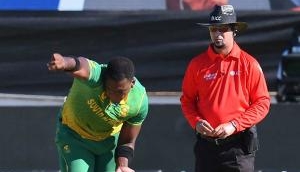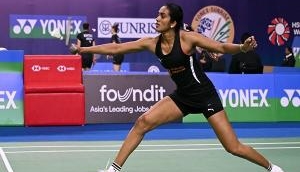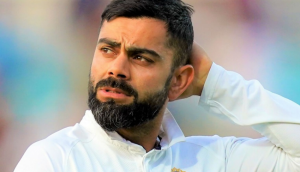SC axes Anurag Thakur as BCCI chief: the clean-up in Indian sport begins here

You can stage a candle-light protest at India Gate against the executive. Or you can go hold a demonstration at Jantar Mantar to dissent against the bureaucracy. But if you do not comply with an order of the judiciary, you are inviting trouble for yourself.
That's what Board of Control for Cricket in India (BCCI) president Anurag Thakur and secretary Ajay Shirke found out on Monday.
After having given the BCCI the longest possible time to implement the Lodha Committee recommendations, which it had approved in toto, the court ordered the removal of the top executives, who were seen to be dithering, and worse, not complying, with its orders.
Thakur and Shirke have no one to blame but themselves - their brinksmanship has led them to being stripped of their posts.
What BCCI honchos could or should have done
Clearly, the pair would have been hoping that the Supreme Court would not come down so heavily, especially after the BCCI appeared to comply with most of the Lodha Committee recommendations. Thakur and Shirke paid a price for not only dragging their feet, but also pleading helplessness in getting the state associations to fall in line with the Supreme Court order.
Things may not have come to this had the BCCI not insisted on not implementing some key recommendations of the Lodha Committtee, including one-state-one-vote, age and tenure restrictions, as well as a cooling off period. The BCCI kept arguing that the president and secretary only acted at the behest of the Board members, and had no real decision-making powers.
Some attempted to rake up the issue of the Board's autonomy as a registered society, but it was always clear that the Supreme Court was viewing BCCI as performing the functions of the State, and therefore, seeing it as an organ of the State. They got the Supreme Court to flex its muscles by not backing off even at a late stage.
The Board would have been better served if it had implemented all the suggestions, and then either sought the court's permission to revoke some, or get the government to pass a law that could help them remain in the corridors of power.
By adopting an ill-advised hardline stance, BCCI painted itself into a corner, from which the only way out was at the mercy of the Supreme Court.
Challenges before committee of administrators
For all that, the yet-to-be-named committee of administrators that will take over the BCCI will now face the stiff challenge of initiating and presiding over the process of overhauling the cricket administration set-up.
In doing so, it will first have to understand the import of the Lodha Committee recommendations, and then go about the accomplishing the daunting task at the national and state levels.
Considering that most state units have been run by the same officials for years - some taking over from their fathers almost as if in inheritance - it will be quite a Herculean challenge for the committee of administrators. It will take some doing for them to find sets of officials to run the show - experienced, eligible and willing to sacrifice time.
Impact beyond the BCCI
Come to think of it, it must be one of the saddest days in the annals of sports administration that two officials of the most visible and powerful sports body were summarily removed by the Court.
Sometime in the future, though, we could end up seeing the second day of 2017 as one on which governance of Indian sports took a turn for the better.
Quite like the impact of an earthquake can be felt even a long way away from its epicentre, the Supreme Court's decision will have a domino effect on other national sports federations (and their state units), which have been opposing the National Sports Code. And that's expected to happen sooner than later.
Indeed, it may only be a matter of time before the Lodha Committee's recommendations become the gold standard for all sports organisations in the country.
Logically, the scope of the recommendations will extend beyond BCCI to all national sports federations, each of whom is deemed to be performing a function of the State when it chooses national teams.
What lawmakers must do
It will also be interesting to see how the government and India's leading political parties respond to the situation. For long, they have played the sort of wait-and-watch game that would do some Test cricketers and chess grandmasters proud.
But now, they must lend their shoulders to the wheel of change that has been set rolling by the Supreme Court.
The government has already told all national sports federations that they need to register themselves as NGOs with the NITI Aayog on its portal to be eligible to receive funds from the government. This has sparked some concern and confusion in some national sports federations, and that can be resolved only by an act of law.
Indeed, the ball is now also in the legislature's court. Parliamentarians and members of state legislatures must pass unambiguous laws, under which the national sports federations and state sports associations, now registered as societies or companies, must be registered to do the business of promoting sport in the country.
Such an Act at the national level will ensure that it becomes mandatory for even the BCCI to be registered under this Central Act - let us call it the National Non-Governmental Sports Organisations Act.
Currently, the BCCI neither feels the need nor is mandated to seek recognition as a national sports federation by the Ministry of Youth Affairs and Sports.
With more and more sports organisations from around the world eyeing the lucrative and stable Indian market, it is imperative that Indian sports bodies achieve the gold standard in terms of transparency, governance and representation of society.
That's how India can achieve greater success in the most competitive world of sport. It needs vision and a collective effort from all sections of society.
Edited by Shreyas Sharma
More in Catch
Anurag Thakur ousted from his post as BCCI president by Supreme Court
Not a personal battle but for the autonomy of BCCI: Anurag Thakur on his ouster
Perjury charge on Anurag Thakur: the writing is on the wall for BCCI
First published: 2 January 2017, 7:51 IST





![BJP's Kapil Mishra recreates Shankar Mahadevan’s ‘Breathless’ song to highlight Delhi pollution [WATCH] BJP's Kapil Mishra recreates Shankar Mahadevan’s ‘Breathless’ song to highlight Delhi pollution [WATCH]](https://images.catchnews.com/upload/2022/11/03/kapil-mishra_240884_300x172.png)

![Anupam Kher shares pictures of his toned body on 67th birthday [MUST SEE] Anupam Kher shares pictures of his toned body on 67th birthday [MUST SEE]](https://images.catchnews.com/upload/2022/03/07/Anupam_kher_231145_300x172.jpg)






